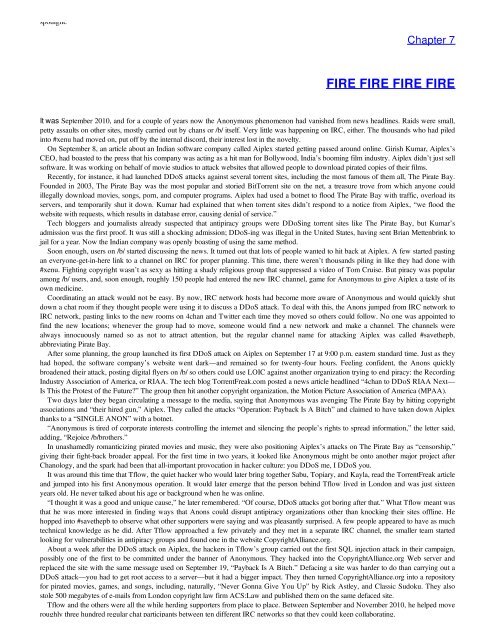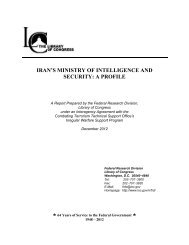We are anonymous inside the hacker world of lulzse
We are anonymous inside the hacker world of lulzse
We are anonymous inside the hacker world of lulzse
You also want an ePaper? Increase the reach of your titles
YUMPU automatically turns print PDFs into web optimized ePapers that Google loves.
spotlight.<br />
Chapter 7<br />
FIRE FIRE FIRE FIRE<br />
It was September 2010, and for a couple <strong>of</strong> years now <strong>the</strong> Anonymous phenomenon had vanished from news headlines. Raids were small,<br />
petty assaults on o<strong>the</strong>r sites, mostly carried out by chans or /b/ itself. Very little was happening on IRC, ei<strong>the</strong>r. The thousands who had piled<br />
into #xenu had moved on, put <strong>of</strong>f by <strong>the</strong> internal discord, <strong>the</strong>ir interest lost in <strong>the</strong> novelty.<br />
On September 8, an article about an Indian s<strong>of</strong>tw<strong>are</strong> company called Aiplex started getting passed around online. Girish Kumar, Aiplex’s<br />
CEO, had boasted to <strong>the</strong> press that his company was acting as a hit man for Bollywood, India’s booming film industry. Aiplex didn’t just sell<br />
s<strong>of</strong>tw<strong>are</strong>. It was working on behalf <strong>of</strong> movie studios to attack websites that allowed people to download pirated copies <strong>of</strong> <strong>the</strong>ir films.<br />
Recently, for instance, it had launched DDoS attacks against several torrent sites, including <strong>the</strong> most famous <strong>of</strong> <strong>the</strong>m all, The Pirate Bay.<br />
Founded in 2003, The Pirate Bay was <strong>the</strong> most popular and storied BitTorrent site on <strong>the</strong> net, a treasure trove from which anyone could<br />
illegally download movies, songs, porn, and computer programs. Aiplex had used a botnet to flood The Pirate Bay with traffic, overload its<br />
servers, and temporarily shut it down. Kumar had explained that when torrent sites didn’t respond to a notice from Aiplex, “we flood <strong>the</strong><br />
website with requests, which results in database error, causing denial <strong>of</strong> service.”<br />
Tech bloggers and journalists already suspected that antipiracy groups were DDoSing torrent sites like The Pirate Bay, but Kumar’s<br />
admission was <strong>the</strong> first pro<strong>of</strong>. It was still a shocking admission; DDoS-ing was illegal in <strong>the</strong> United States, having sent Brian Mettenbrink to<br />
jail for a year. Now <strong>the</strong> Indian company was openly boasting <strong>of</strong> using <strong>the</strong> same method.<br />
Soon enough, users on /b/ started discussing <strong>the</strong> news. It turned out that lots <strong>of</strong> people wanted to hit back at Aiplex. A few started pasting<br />
an everyone-get-in-here link to a channel on IRC for proper planning. This time, <strong>the</strong>re weren’t thousands piling in like <strong>the</strong>y had done with<br />
#xenu. Fighting copyright wasn’t as sexy as hitting a shady religious group that suppressed a video <strong>of</strong> Tom Cruise. But piracy was popular<br />
among /b/ users, and, soon enough, roughly 150 people had entered <strong>the</strong> new IRC channel, game for Anonymous to give Aiplex a taste <strong>of</strong> its<br />
own medicine.<br />
Coordinating an attack would not be easy. By now, IRC network hosts had become more aw<strong>are</strong> <strong>of</strong> Anonymous and would quickly shut<br />
down a chat room if <strong>the</strong>y thought people were using it to discuss a DDoS attack. To deal with this, <strong>the</strong> Anons jumped from IRC network to<br />
IRC network, pasting links to <strong>the</strong> new rooms on 4chan and Twitter each time <strong>the</strong>y moved so o<strong>the</strong>rs could follow. No one was appointed to<br />
find <strong>the</strong> new locations; whenever <strong>the</strong> group had to move, someone would find a new network and make a channel. The channels were<br />
always innocuously named so as not to attract attention, but <strong>the</strong> regular channel name for attacking Aiplex was called #save<strong>the</strong>pb,<br />
abbreviating Pirate Bay.<br />
After some planning, <strong>the</strong> group launched its first DDoS attack on Aiplex on September 17 at 9:00 p.m. eastern standard time. Just as <strong>the</strong>y<br />
had hoped, <strong>the</strong> s<strong>of</strong>tw<strong>are</strong> company’s website went dark—and remained so for twenty-four hours. Feeling confident, <strong>the</strong> Anons quickly<br />
broadened <strong>the</strong>ir attack, posting digital flyers on /b/ so o<strong>the</strong>rs could use LOIC against ano<strong>the</strong>r organization trying to end piracy: <strong>the</strong> Recording<br />
Industry Association <strong>of</strong> America, or RIAA. The tech blog TorrentFreak.com posted a news article headlined “4chan to DDoS RIAA Next—<br />
Is This <strong>the</strong> Protest <strong>of</strong> <strong>the</strong> Future?” The group <strong>the</strong>n hit ano<strong>the</strong>r copyright organization, <strong>the</strong> Motion Picture Association <strong>of</strong> America (MPAA).<br />
Two days later <strong>the</strong>y began circulating a message to <strong>the</strong> media, saying that Anonymous was avenging The Pirate Bay by hitting copyright<br />
associations and “<strong>the</strong>ir hired gun,” Aiplex. They called <strong>the</strong> attacks “Operation: Payback Is A Bitch” and claimed to have taken down Aiplex<br />
thanks to a “SINGLE ANON” with a botnet.<br />
“Anonymous is tired <strong>of</strong> corporate interests controlling <strong>the</strong> internet and silencing <strong>the</strong> people’s rights to spread information,” <strong>the</strong> letter said,<br />
adding, “Rejoice /b/bro<strong>the</strong>rs.”<br />
In unashamedly romanticizing pirated movies and music, <strong>the</strong>y were also positioning Aiplex’s attacks on The Pirate Bay as “censorship,”<br />
giving <strong>the</strong>ir fight-back broader appeal. For <strong>the</strong> first time in two years, it looked like Anonymous might be onto ano<strong>the</strong>r major project after<br />
Chanology, and <strong>the</strong> spark had been that all-important provocation in <strong>hacker</strong> culture: you DDoS me, I DDoS you.<br />
It was around this time that Tflow, <strong>the</strong> quiet <strong>hacker</strong> who would later bring toge<strong>the</strong>r Sabu, Topiary, and Kayla, read <strong>the</strong> TorrentFreak article<br />
and jumped into his first Anonymous operation. It would later emerge that <strong>the</strong> person behind Tflow lived in London and was just sixteen<br />
years old. He never talked about his age or background when he was online.<br />
“I thought it was a good and unique cause,” he later remembered. “Of course, DDoS attacks got boring after that.” What Tflow meant was<br />
that he was more interested in finding ways that Anons could disrupt antipiracy organizations o<strong>the</strong>r than knocking <strong>the</strong>ir sites <strong>of</strong>fline. He<br />
hopped into #save<strong>the</strong>pb to observe what o<strong>the</strong>r supporters were saying and was pleasantly surprised. A few people appe<strong>are</strong>d to have as much<br />
technical knowledge as he did. After Tflow approached a few privately and <strong>the</strong>y met in a separate IRC channel, <strong>the</strong> smaller team started<br />
looking for vulnerabilities in antipiracy groups and found one in <strong>the</strong> website CopyrightAlliance.org.<br />
About a week after <strong>the</strong> DDoS attack on Aiplex, <strong>the</strong> <strong>hacker</strong>s in Tflow’s group carried out <strong>the</strong> first SQL injection attack in <strong>the</strong>ir campaign,<br />
possibly one <strong>of</strong> <strong>the</strong> first to be committed under <strong>the</strong> banner <strong>of</strong> Anonymous. They hacked into <strong>the</strong> CopyrightAlliance.org <strong>We</strong>b server and<br />
replaced <strong>the</strong> site with <strong>the</strong> same message used on September 19, “Payback Is A Bitch.” Defacing a site was harder to do than carrying out a<br />
DDoS attack—you had to get root access to a server—but it had a bigger impact. They <strong>the</strong>n turned CopyrightAlliance.org into a repository<br />
for pirated movies, games, and songs, including, naturally, “Never Gonna Give You Up” by Rick Astley, and Classic Sudoku. They also<br />
stole 500 megabytes <strong>of</strong> e-mails from London copyright law firm ACS:Law and published <strong>the</strong>m on <strong>the</strong> same defaced site.<br />
Tflow and <strong>the</strong> o<strong>the</strong>rs were all <strong>the</strong> while herding supporters from place to place. Between September and November 2010, he helped move<br />
roughly three hundred regular chat participants between ten different IRC networks so that <strong>the</strong>y could keep collaborating.



